Legal experts have slammed a recent presidential decree issued by President Recep Tayyip Erdoğan that threatens Turkish media with reprisal if they disseminate content deemed contrary to the country’s “fundamental national and moral values,” Deutsche Welle Turkish service reported.
In a decree published in the Official Gazette on Saturday, Erdoğan said measures were needed to protect Turkey’s “national culture” and prevent its children’s development “from being adversely affected as a result of exposure to harmful content in all written, verbal and visual media.”
The president said legal action would be taken against “overt or covert activities through the media aimed at undermining our national and moral values and disrupting our family and social structure,” without specifying what such content was.
Professor Osman Korkut Kanadoğlu, dean of the law faculty and an instructor in constitutional law at İstanbul Okan University, told DW that the decree was “contrary to the basic principles of a democratic state of law.”
Kanadoğlu argued that the decree should be canceled since its content wasn’t “specific and objective,” and said there were already enough specific legal provisions about media content that disrupts the family structure and harms youth in the Turkish legal system.
Kanadoğlu said that if the legal provisions about such media content were thought to be insufficient, it was within the authority of the Turkish parliament as the legislative body, and not Erdoğan, to change that, because otherwise, the situation would constitute a “usurpation” of the legislature by the executive.
Prof. Dr. Yaman Akdeniz, a faculty member of the İstanbul Bilgi University law school, also told DW that the decree “had no legal basis” and that it should be considered a “warning” by the president.
Also referring to the recent arrest of journalist Sedef Kabaş on charges of insulting the president, Akdeniz said such moves revealed Erdoğan and his ruling Justice and Development Party’s (AKP) aim to “squash and silence” dissent.
İlhan Taşçı, a member of the Radio and Television Supreme Council (RTÜK), Turkey’s broadcasting watchdog, from the main opposition Republican People’s Party (CHP), told DW that Erdoğan aimed to “stifle even more” the broadcasters critical of his AKP government by way of the regulation.
Taşçı also said RTÜK wouldn’t take any legal action over content “incompatible with national and moral values” since most of such content was being broadcast on pro-government TV channels.
The decree follows the launch of Fox TV’s Turkish adaptation of the international show “The Masked Singer,” where celebrities perform in costume to hide their identities. The show has been criticized online for alleged satanic and pagan content.
Journalist Birsen Altuntaş recently predicted in an article on her website that the show would be taken off the air following its ninth episode.
Erdoğan, who has been in power for nearly 20 years, has often criticized media content that is out of step with the conservative Islamic values espoused by his AKP.
The majority of media companies in Turkey are already owned by businesses close to the government and closely adhere to the government line.
There has been an international outcry over perceived crackdowns on freedom of speech by the Turkish government, which is accused by many of undermining media freedom by arresting journalists and shutting down critical media outlets, especially since Erdoğan survived a coup attempt in July 2016.
Reporters Without Borders ranks Turkey at 153 out of 180 countries in its World Press Freedom Index of 2021.

